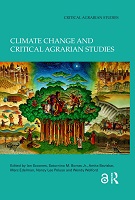Climate Change and Critical Agrarian Studies
Proposal review
| dc.contributor.editor | Scoones, Ian | |
| dc.contributor.editor | Borras Jr., Saturnino M. | |
| dc.contributor.editor | Baviskar, Amita | |
| dc.contributor.editor | Edelman, Marc | |
| dc.contributor.editor | Peluso, Nancy Lee | |
| dc.contributor.editor | Wolford, Wendy | |
| dc.date.accessioned | 2023-11-21T14:17:24Z | |
| dc.date.available | 2023-11-21T14:17:24Z | |
| dc.date.issued | 2024 | |
| dc.identifier | OCN: 1410495589 | |
| dc.identifier.uri | https://library.oapen.org/handle/20.500.12657/85297 | |
| dc.description.abstract | Climate change is perhaps the greatest threat to humanity today and plays out as a cruel engine of myriad forms of injustice, violence and destruction. The effects of climate change from human-made emissions of greenhouse gases are devastating and accelerating; yet are uncertain and uneven both in terms of geography and socio-economic impacts. Emerging from the dynamics of capitalism since the industrial revolution — as well as industrialisation under state-led socialism — the consequences of climate change are especially profound for the countryside and its inhabitants. The book interrogates the narratives and strategies that frame climate change and examines the institutionalised responses in agrarian settings, highlighting what exclusions and inclusions result. It explores how different people — in relation to class and other co-constituted axes of social difference such as gender, race, ethnicity, age and occupation — are affected by climate change, as well as the climate adaptation and mitigation responses being implemented in rural areas. The book in turn explores how climate change – and the responses to it - affect processes of social differentiation, trajectories of accumulation and in turn agrarian politics. Finally, the book examines what strategies are required to confront climate change, and the underlying political-economic dynamics that cause it, reflecting on what this means for agrarian struggles across the world. The 26 chapters in this volume explore how the relationship between capitalism and climate change plays out in the rural world and, in particular, the way agrarian struggles connect with the huge challenge of climate change. Through a huge variety of case studies alongside more conceptual chapters, the book makes the often-missing connection between climate change and critical agrarian studies. The book argues that making the connection between climate and agrarian justice is crucial. The chapters in this book were originally published in The Journal of Peasant Studies. | en_US |
| dc.language | English | en_US |
| dc.relation.ispartofseries | Critical Agrarian Studies | en_US |
| dc.subject.other | Agrarian justice;Climate change;Climate Smart Agriculture;Critical Agrarian Studies;Environmental Politics | en_US |
| dc.title | Climate Change and Critical Agrarian Studies | en_US |
| dc.type | book | |
| oapen.identifier.doi | 10.4324/9781003467960 | en_US |
| oapen.relation.isPublishedBy | 7b3c7b10-5b1e-40b3-860e-c6dd5197f0bb | en_US |
| oapen.relation.isbn | 9781032741673 | en_US |
| oapen.relation.isbn | 9781003467960 | en_US |
| oapen.relation.isbn | 9781032741659 | en_US |
| oapen.imprint | Routledge | en_US |
| oapen.pages | 679 | en_US |
| peerreview.anonymity | Single-anonymised | |
| peerreview.id | bc80075c-96cc-4740-a9f3-a234bc2598f1 | |
| peerreview.open.review | No | |
| peerreview.publish.responsibility | Publisher | |
| peerreview.review.stage | Pre-publication | |
| peerreview.review.type | Proposal | |
| peerreview.reviewer.type | Internal editor | |
| peerreview.reviewer.type | External peer reviewer | |
| peerreview.title | Proposal review |

